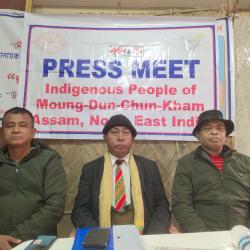The Brahmaputra (Tsan-Po in Chinese) river originates on the northern slope of the Himalayas in Tibet, China. It flows eastwards for a length of about 1,130 km and then takes a sharp bend towards south and enters Arunachal Pradesh of India. It travels through Arunachal Pradesh, Assam and Meghalaya and then enters Bangladesh at Bahadurabad Ghat. The segment of the river between Bahadurabad and Aricha, where the river joins the river Padma (as the Ganga is known in Bangladesh), is popularly known as Jamuna in Bangladesh. The total length of the river from the source to the sea is about 2840 km. Within Bangladesh, the channel varies considerably in width ranging from less than 2.0 km to more than 12.0 km.
The discharge of the Brahmaputra is mostly contributed by the melting snow in Tibet before it reaches the Arunachal Pradesh in India. In north eastern states of India and in Bangladesh rainfall is quite heavy. This contributes to a substantial amount of flow in the river.
The Ganga is a combination of the Alakananda and the Bhagirathi, which meet at Deva Prayag in Uttaranchal Pradesh of India, also within the mountain range of the Himalayas. From the original southward course it flows through easterly direction and finally in its last lap, the Ganga flows again southward until it meets the Bay of Bengal.
The Yamuna, a tributary, joins the Ganga at Allahabad in India. The Ganga then enters Bangladesh near Farakka and joins the Brahmaputra near Goalanda Ghat assuming the name of the Padma and further down the combined discharge joins the Meghna at Chandpur. The mighty combined flow then runs for another 100 km or so and falls into the Bay of Bengal. The total length of the river Ganga/Padma from Deba Prayag to the sea is about 2,515 km. The Surma-Kushiara-Meghna river system flows on the east of the Brahmaputra river through Bangladesh. The Surma rises as the Barak in Assam in India and is divided into two branches namely Surma and Kushiara. Both flow through Indian territories and then enter Bangladesh, where they join the Meghna at different points in Sylhet. The lower Meghna is one of the largest rivers in the world, as it is the confluence of the three great river systems - the Ganga-Padma, the Brahmaputra and the Meghna. The total length of the river is about 930 km.
Both India and Bangladesh are regularly affected by floods due to widespread heavy rainfall in the catchment areas and inadequate capacity of the river channel to contain the flood flow within the banks of the river.
Resolving conflicts over water management issues for international rivers present huge challenges for the nations of the world. However since changing national boundaries is not an option, we have to develop understanding and mutual respect in order to resolve water resources management issues for the benefit of all riparian countries. As there are compelling economic reasons for the mutual benefits that will accrue to cooperative management and development of transnational river basins, we hope governments of Bangladesh, India, Nepal, Bhutan and China will work together and establish such a cooperative management structure for the Ganga-Brahmaputra(Tsan-Po)-Meghna basin.
Nuruddin Azam, Australia
- Add new comment
- 58301 reads










Comments
Pages
Add new comment